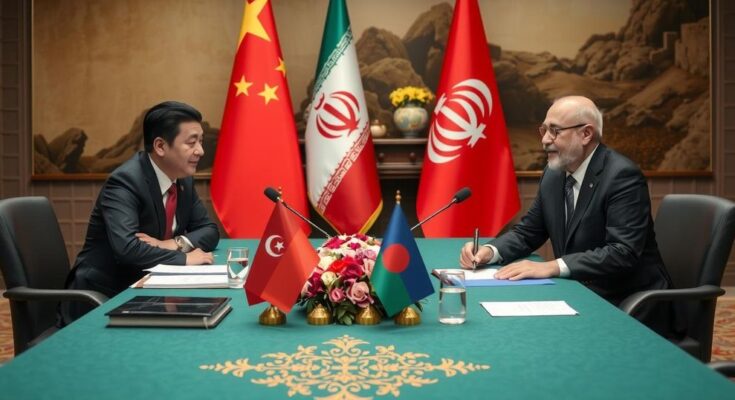The Chinese and Iranian foreign ministers met in Beijing to discuss urgent regional issues, emphasizing the need for a ceasefire in Gaza and humanitarian aid for Syria. Key discussions included enhancing cooperation through multilateral frameworks and addressing the roles of Iran’s proxies in regional conflicts.
In a significant diplomatic meeting in Beijing, the foreign ministers of China and Iran convened to discuss matters of mutual interest, particularly the ongoing conflicts in the Middle East. The discussions highlighted the necessity for a ceasefire in Gaza amidst escalating tensions and the need for humanitarian assistance in Syria. Chinese Foreign Minister Wang Yi emphasized the importance of continuous support for shared core interests, practical cooperation, and collaboration in multilateral spheres, while also calling for enhanced coordination within frameworks such as the Shanghai Cooperation Organization (SCO) and BRICS. The ministers also acknowledged Tehran’s involvement through its proxies, notably Hamas and Hezbollah, in the conflicts affecting Gaza and Lebanon, stressing the urgency of addressing these issues to maintain stability in the region.
The recent meeting between Chinese and Iranian foreign ministers occurs against a backdrop of significant geopolitical concerns in the Middle East, particularly in relation to the conflicts involving Israel and Palestine, as well as disturbances in Lebanon. The involvement of Iran’s proxies such as Hamas and Hezbollah complicates the regional dynamics, where external powers like China seek to position themselves as mediators. This meeting illustrates China’s growing diplomatic presence in Middle Eastern affairs, particularly in collaborating with Iran, a key ally, as both nations navigate the challenges posed by Western influences.
In conclusion, the meeting between the Chinese and Iranian foreign ministers underscores the growing collaboration between the two nations on pressing regional issues, specifically the need for a ceasefire in Gaza and continued support for Syria. Their commitment to multilateral cooperation reflects a broader desire to bolster their influence in the international arena, particularly among developing nations, as they seek to navigate the complexities of Middle Eastern geopolitics. This partnership emphasizes the importance of diplomatic dialogue in resolving conflicts and enhancing regional stability.
Original Source: www.scmp.com




